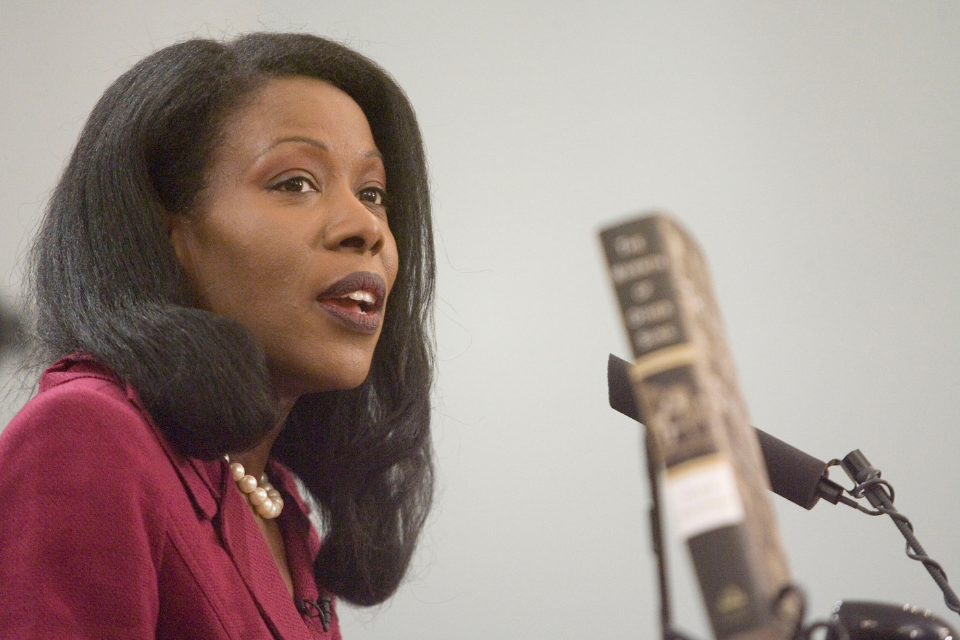BOLLI Lecture Series: 'Caste: The Origins of Our Discontents'
February 18, 2021

Photo Description: Isabel Wilkerson speaking at a microphone. | Photo Credit: Miller Center via Wikimedia
by Joyce Lazarus
Every day we hear loud, urgent calls to address the problem of systemic racism in America. While we can all agree that racism continues to plague our nation, we may wonder what we can do to rid society of it. In January, Bridget Kelleher, a doctoral student in American history at Brandeis, gave a two-part lecture series on award-winning author Isabel Wilkerson’s newest book, "Caste: The Origins of Our Discontents." The lectures, followed by animated discussion in our large online BOLLI community, helped us to face up to our country’s troubled past and to confront the task of rebuilding a more just society.
Wilkerson’s beautifully written book is an indictment of America for its shameful legacy of slavery: Jim Crow laws, segregation, mistreatment of Blacks through police brutality, and political and economic policies that perpetuate racism. In an original approach to this subject, Wilkerson uses “caste” as a metaphor for our social infrastructure, for a hierarchy in American society with Whites on top and Blacks on the bottom that has been perpetuated from generation to generation for over four hundred years, since the first African slave ship arrived in Virginia in 1619.
We have inherited and (according to Wilkerson) we perpetuate this system, which gives privileges to some while discriminating against others. Wilkerson prefers the terms “caste” and “social hierarchy” to “racism” because she believes the latter term is focused on individuals rather than on a collectivity. Individuals often deny that they harbor feelings of animus towards minorities; yet, the author maintains, we are born into this hierarchical system and each of us is part of a group held rigidly in its place. Race, she writes, is an ideology that came into existence only at a distinct historical moment, the beginning of colonization of the New World, and it is fluid, subject to redefinition to meet the needs of a dominant caste. Race is thus an agent of a largely unrecognized caste system. “Caste is bones, race is the skin,” writes Wilkerson. Our caste system assigns a fixed ranking of groups, and sets the presumed supremacy of one group against the presumed inferiority of other groups on the basis of ancestry and immutable physical traits, thereby creating a double standard which promotes the economic and social subjugation of citizens of color.
Wilkerson describes various “pillars” of the caste system, which include rationalization of this hierarchy based on the Bible and “laws of nature,” and its perpetuation through laws such as the prohibition of interracial marriage, segregation, and Jim Crow. Lastly, she describes enforcement of racial laws through violence and fear, including lynchings and the violence perpetrated by the Ku Klux Klan.
There are parallels developed in the book between the American caste system and that of other countries such as Nazi Germany and India, with their victimization of Jews and Untouchables, respectively. What all have in common is the dehumanization, persecution, and even state-sanctioned murder of those at the bottom of the social structure.
Kelleher criticized Wilkerson’s omission of references to Native Americans, who were marked for genocide when about 100,000 of them were subjected to forced relocation during the “Trail of Tears.” The reason for the omission, Kelleher speculates, is that this incident doesn’t fit the caste model. The lecturer disagreed with several of Wilkerson’s conclusions, pointing out that the author’s focus on the relationship between Whites and Blacks neglects to address in depth the issues of others who suffered under the caste system, including Latinos and Asians.
How do we build a more just society? Wilkerson feels that Americans must first face up to our country’s shameful past, just as South Africa and Germany did. In addition, we must speak out more loudly about disparities and advocate more passionately for economic, political and educational policies that alleviate inequities. This includes supporting efforts to raise the minimum wage, create more affordable housing, strengthen unions, provide aid for childcare and higher education, and increase employment of minorities. Wilkerson further believes that we need to harshly punish hate crimes and curb the spreading of misinformation on social media, and that our children and grandchildren must be taught the importance of racial equality. We may then begin to break out of our caste system through development of a “radical empathy” that allows us to perceive the world through the experiences and points of view of others. Only then can we come closer to Martin Luther King, Jr’s dream of a post-racial society.